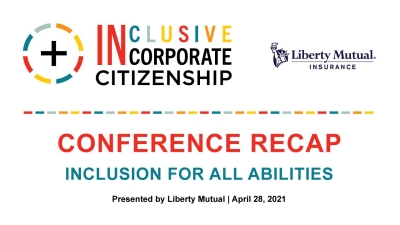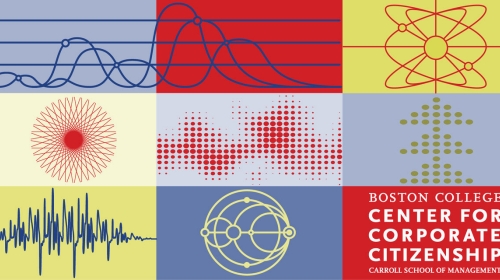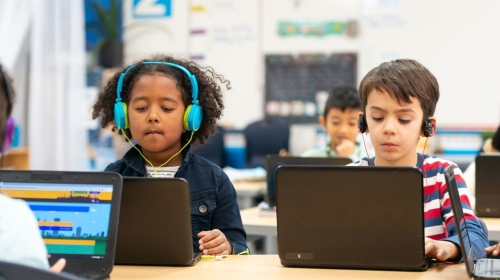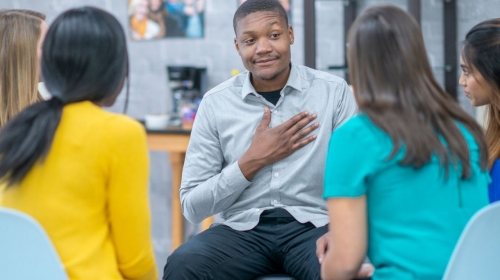REPORT - Survey results reveal this path to success in corporate social responsibility (CSR) and business success. Read the latest findings on how to create business AND social value.
2021 Conference Recap: Inclusion for all abilities

After enthusiastic and tactical discussions in a final round of breakout sessions, attendees at the International Corporate Citizenship Conference entered the virtual auditorium for what was sure to be an inspiring talk from a keynote speaker who understands firsthand the power of inclusion: Dr. Jonathan Kaufman.
But first, a recap of the final round of breakout sessions, where participants tackled programmatic challenges such as identifying stakeholders, sustainability reporting frameworks, and the top issue on most CSR professionals' minds this year: virtual volunteering. In a case study session, attendees also got a behind-the-scenes look at how FedEx is blending operations, in-kind support, and skills-based volunteering to respond to the pandemic.
In the session, “Who’s your squad? Building internal partnerships that deliver stellar programs,” featuring Fannie Mae, Delta Dental, Palo Alto Networks, and Wells Fargo, attendees learned best practices for engaging with other departments to achieve social impact goals. The panel agreed that frequent and clear communication is key to creating and maintaining these relationships, in addition to seeking opportunities to achieve mutual wins. Okeatta Brown of Wells Fargo remarked on how remote work brought has invited authenticity and creativity into these conversations. “Diverse perspectives are good for innovation,” said Brown. “Are you going to have challengers, in a good way? I keep myself open to different mindsets.”
In the next general session, participants were welcomed by Melissa MacDonnell, president of the Liberty Mutual Foundation, as she introduced the keynote speaker, Dr. Jonathan Kaufman, and shared insights into the Foundation’s philanthropic focus on accessibility, which addresses a persistent problem: People with disabilities are under-represented and under-employed in the workforce, and most likely to be socially isolated. The Foundation has also found that siloes exist among disability-focused nonprofits that do not encourage collaboration.
MacDonnell detailed a number of organizations and efforts that Liberty supports in its accessibility work, including building universally accessible playgrounds in Boston, MA, and Plano, TX. Supplementing these philanthropic efforts are initiatives to expand accessibility resources for all Liberty Mutual Foundation’s grantees, such as a skill-building capacity camp. “Supporting the ecosystem is where we can make the biggest long-term difference,” said MacDonnell. “We believe that we fund the best-in-class programs, and we want those programs to be accessible to all.”
Dr. Kaufman took the stage and encouraged attendees to view inclusion for differently abled people as a gateway to ingenuity. Born with cerebral palsy, Dr. Kaufman knows firsthand the critical importance of inclusion and accessibility for persons with disabilities—in the workplace and in daily life. Accessibility has come to the fore, he said, as a visible and invisible demographic that runs across race, gender, age, sexual orientation, and many other identities.
Dr. Kaufman pointed out that in this time of remote work, global pandemic, racial injustice, and all-around transformation, we have the opportunity to reframe the way we talk about and engage with persons with disabilities. Dr. Kaufman reminded the audience that there are 1.8 billion individuals with disabilities, who are our employees, customers, and other key stakeholders. “We need people with disabilities to inform us of what virtual work looks like,” Dr. Kaufman said. “What is helpful? How do people with disabilities become stakeholders in the next best practice?”
Most importantly, Dr. Kaufman emphasized that disability can be a language of innovation. Someone who has a disability, he said, has to be innovative in order to engage in a world that is not made for them. That lived experience gives persons with disabilities transferable skills that translate to innovation in the workplace, such as adaptation, patience, and resilience. This goes for not only employees, but also the products companies can create. Dr. Kaufman raised the example of Nike’s FlyEase shoe, a hands-free shoe the company developed in collaboration with the disability community, which was prompted by a letter from a U.S. teenager with cerebral palsy.
In reducing stigma, Dr. Kaufman stressed that representation matters. Using the example of the past week’s very public Oscars ceremony, he noted that films featuring persons with disabilities were nominated, there was a sign language interpreter, and the stage was wheelchair-accessible. When asked about how to be an effective ally, Dr. Kaufman reminded the audience about the breadth of the disability community. “It behooves everyone to be an ally to this community, because you are connected to it in some shape or form,” said Dr. Kaufman. “You are being an ally of what it means to the human.
In the final session, attendees gathered in the virtual auditorium to hear closing thoughts from Boston College Center for Corporate Citizenship’s Executive Director Katherine Smith, who thanked the sponsors that made the Conference possible, especially convener Wells Fargo. Smith once again thanked virtual platform sponsor Vanguard for making it possible for attendees to experience the event remotely, inclusion sponsor Toyota for live captioning, and digital carbon offset sponsor Target for mitigating environmental impacts from both a virtual and in-person event. In an exciting update about the event’s virtual volunteer project, Freerice, Smith announced that conference attendees exceeded their goal of 1 billion grains of rice donated to the UN World Food Programme.
Smith reflected on the past three days and the theme of our conference, inclusive corporate citizenship, and implications for diversity, equity, and inclusion in the present and the future. “When we’re in inclusion, we’re participating fully and able to be our full joyful selves,” said Smith. “I would offer that these last few days has shown us that we really need to transform the way that we think about the role of business in creating equity and inclusion.”
Smith also invited attendees to join the Center again—hopefully in person—for the 2022 International Corporate Citizenship Conference with convening sponsor Liberty Mutual.
And with that the 2021 International Corporate Citizenship Conference came to a close. Attendees looked forward to reviewing the conference recordings, which would be released in the next several weeks and made available for an entire year. They exited the virtual auditorium with a refreshed perspective and new ideas to apply to their important corporate social responsibility work—building inclusion into all aspects of business.
That’s all for the 2021 International Corporate Citizenship Conference!
Visit the Corporate Citizenship Perspectives Blog to read all the recaps and subscribe to receive blog updates.
Related Content
The U.S. Fish and Wildlife Service (FWS) and the National Marine Fisheries Service (NMFS) finalized a recent set of revisions to the Endangered Species Act that were rolled back under the previous presidential administration.
The United Nations (UN) General Assembly unanimously adopted the first global resolution on artificial intelligence (AI).
Spain’s Council of Ministers has approved a 5% increase in monthly minimum wage.
The California Department of Water Resources (DWR) released the California Water Plan Update 2023 (CWP 2023 Update) and calls the plan “A Roadmap to Water Management and Infrastructure for a Water Resilient Future.”
Wisconsin Governor Tony Evers signed into law the country’s third earned wage access (EWA) bill.
Not all communities have equal access to the hardware, connectivity, or digital literacy that is essential for learning and thriving in today’s society. This member meetup spotlights companies offering solutions.
WEBINAR: Re-watch this webinar to better understand your feelings of stress and/or burnout as a CSR professional, and to explore different strategies that may support you and your colleagues.









